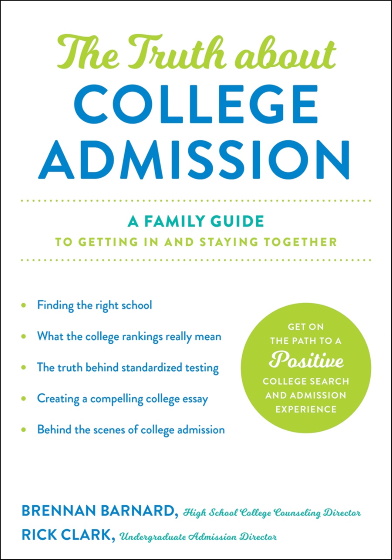You have /5 articles left.
Sign up for a free account or log in.

Istockphoto.com/Jacob Lund
The Truth About College Admission (Johns Hopkins University Press) bills itself as "a family guide," recognizing the role of parents and students in the college admissions process. And the authors, Brennan Barnard, director of college counseling at the Derryfield School, and Rick Clark, director of undergraduate admissions at the Georgia Institute of Technology, have advice for everyone.
They responded via email to questions about their book.
Q: Early in the book, you have a chapter called "Why are you going to college?" Why is this an important question to ask?
A: Too often students launch into the college admission experience under self-imposed or external pressure from family and school community, focused on where they can get in or what they need to do to look good for colleges. As a result, their list and perspective is too narrow because they’re leaning toward what is familiar, acceptable or expected of them.
 This is a flawed and limited mentality, which we believe puts the cart before the horse. To find a good match in a college, students need to consider why they are pursuing higher education. What are their hopes, dreams and goals? What are their specific wants and needs? Asking "why college?" is foundational. There is no right answer, because (like a good overall college search/selection process) it is uniquely personal. Ironically, however, far too few students, especially from homes, schools and communities that deeply value higher education, ever take the time to think about and write these answers down. Determining your why not only helps determining where to visit and apply, but is also critical in ultimately selecting a college after being admitted to multiple institutions.
This is a flawed and limited mentality, which we believe puts the cart before the horse. To find a good match in a college, students need to consider why they are pursuing higher education. What are their hopes, dreams and goals? What are their specific wants and needs? Asking "why college?" is foundational. There is no right answer, because (like a good overall college search/selection process) it is uniquely personal. Ironically, however, far too few students, especially from homes, schools and communities that deeply value higher education, ever take the time to think about and write these answers down. Determining your why not only helps determining where to visit and apply, but is also critical in ultimately selecting a college after being admitted to multiple institutions.
Q: In a chapter on remapping admissions, you advise students to "think like a dean." Why is this important?
A: When deans of admission begin planning to create a class, they cast a wide net. They buy names of many thousands more students than they have spots available. They mail brochures, send emails and invite students to campus who they hope will apply. However, they know not all students will respond or take action. They also know some will not ultimately be a good fit or will choose their school in the end.
Students can learn from that same “admissions funnel” mentality. Just like deans don’t market to or target only the precise number of students they need in their class, students should not focus only on one school or small set of schools. Instead, they should keep an open mind, consider what they’re looking for in a college broadly, start high level. Think like a dean!
Q: You talk about what parents should and should not do. Could you give some examples?
A: We believe parents should be more like coaches and partners in the college admission experience. Our hope is that rather than trying to “steer the ship,” they’ll climb up into the crow's nest and use their wisdom and perspective to help navigate.
Parents of high school students should talk to fewer parents of high school students about college admission. Those conversations are typically unhelpful, inaccurate echo chambers that foster anxiety and misinformation. Instead, they should talk with more parents of current college students -- folks who have been through it before. They never say, “We wished we’d stressed more.” Instead, they’ll inevitably respond, “While we could not have predicted exactly how it would go, it all worked out for the best.”
Parents should talk early and honestly about money with their child. They’ll be amazed by the power of “opening the books” and sharing the responsibility and reality of paying for college. They should consider and articulate their financial conditions, limitations and expectations. It is fine to give specific amounts of money they’re willing to pay, or even certain schools, majors, etc., that they will pay more or less for -- but they must do this before a student applies, and ideally during the spring of junior year. It is neither fair nor pretty to see these types of conversations transpire after a student been admitted, bought the hoodie, posted on social media and now feels like the financial rug is being pulled out from under them.
We hope parents will remember they cannot control admission decisions, scholarship amounts or selection to honors colleges, especially not at the country’s more selective schools. However, they can control how they approach this experience and communicate. They can see this as an opportunity to actually grow closer as a family by listening, staying open-minded, supporting and reminding their child often, “I trust you. And I’m proud of you.”
Q: In your section on campus visits, you talk about questions to ask -- and suggest changes in those questions. Why?
A: The truth is admission officers typically lean on the same numbers to tell their institution’s story. While these serve as a good starting point, they tell a limited story. For instance, a 19-to-one student-to-faculty ratio does not mean students are likely to find themselves learning about introductory psychology outside, around a tree, surrounded by 18 of their good friends. Instead, that number includes adjunct faculty, people who only teach one upper-level class, or perhaps even some who are on sabbatical. We urge readers to unpack the numbers and ask detailed questions about their anticipated individual experience, i.e., “What is the most common class size of introductory courses?” “What is the most common class size in my major?” and “How do class sizes differ from first year to senior year?”
Drilling down on retention and graduation rates is another important way prospective students can be responsible, informed “consumers.” “Why do students leave?” Answers will vary. Some may reassure you, while others may be disconcerting. But you’ll never know if you simply take these at face value. A school may have a lower four-year graduation rate than another school you are considering. However, if the reason is because that university is helping students get great internships that delay graduation but result in more job offers, higher salaries or excellent grad school placement rates, that metric now tells an entirely different story. In the book, we also suggest similar reframing of questions around school culture and opportunities to help students begin to make a good match.
Q: What is your message for students and parents about the admissions process? What don't they get elsewhere that you hope they will get from the book?
A: While most books about admission are either written by journalists looking in briefly at a limited number of colleges or students, we have both worked in this profession for two decades at a variety of colleges and high schools. Having a front-row seat and watching this cycle repeat itself over and over, we have come to appreciate the truth --- at its core, college admission is about family. And unfortunately too many families focus on “getting in” (something they cannot fully control) when they should be committed to staying together.
Too often the narrative surrounding college admission in news headlines or at neighborhood parties is that it’s stressful or overwhelming. This book helps families keep perspective, have more healthy and balanced conversations, listen and understand one another, reinforce their family values and walk forward together -- rather than allowing certain wedges to drive them apart.
Ultimately, college is all about learning, growing, broadening horizons, exploring and making friendships and connections that will last a lifetime. We believe the college admission experience can be the same. That’s why we wrote this book.








